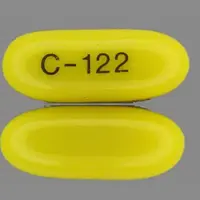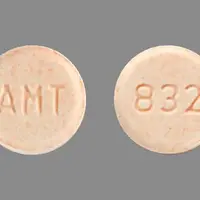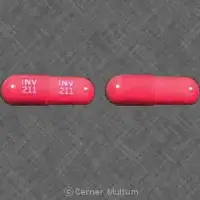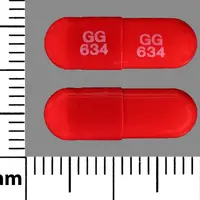Generic name: amantadine
Drug class: Adamantane antivirals, Dopaminergic antiparkinsonism agents
Availability: Prescription only
Pregnancy & Lactation: Risk data available
Brand names: Gocovri, Osmolex er
What is Amantadine?
Amantadine is an antiviral medicine that blocks the actions of viruses in your body.
Amantadine is used to treat Parkinson's disease and "Parkinson-like" symptoms such as stiffness or tremors, shaking, and repetitive uncontrolled muscle movements that may be caused by the use of certain drugs.
Amantadine is also used to treat or prevent influenza A in adults and children. It may not be effective during every flu season because certain strains of the virus may be resistant to amantadine. This medicine should not be used in place of getting a yearly flu shot. The Centers for Disease Control recommends an annual flu shot to help protect you each year from new strains of influenza virus.
Amantadine is available as tablets, capsules, and oral solution.
Warnings
You should not use amantadine if you received a nasal flu vaccine in the past 14 days.
Do not receive a nasal flu vaccine while taking amantadine, and for at least 48 hours after your last dose. You may receive a flu shot (injection) while taking amantadine.
Avoid driving and doing other tasks or actions that call for you to be alert or have clear eyesight until you see how this amantadine affects you.
To lower the chance of feeling dizzy or passing out, rise slowly if you have been sitting or lying down. Be careful going up and down stairs.
Heat stroke has happened in people taking amantadine. Be careful in hot weather and during physical activity.
If you have kidney problems, talk with your doctor. Your dose may need to be changed based on how well your kidneys work. Deaths have happened in people with kidney problems whose dose was too high for their kidney function.
Do not stop taking amantadine all of a sudden without calling your doctor. You may have a greater risk of side effects. If you need to stop amantadine, you will want to slowly stop it as ordered by your doctor.
How should I take Amantadine
Amantadine comes as a capsule, extended-release capsule (Gocovri), tablet, extended-release tablet (Osmolex), and liquid to take by mouth. The capsules, tablets, and liquid medications are usually taken once or twice a day. The extended-release capsules are usually taken once a day at bedtime. The extended-release tablets are usually taken once a day in the morning. Take amantadine at around the same time(s) every day. Follow the directions on your prescription label carefully, and ask your doctor or pharmacist to explain any part you do not understand. Take amantadine exactly as directed. Do not take more or less of it or take it more often than prescribed by your doctor.
Swallow the extended-release capsules and extended-release tablets whole; do not split, chew, or crush them. If you have difficulty swallowing the extended-release capsule, you may open the capsule and sprinkle the entire contents on a teaspoonful of soft food, like applesauce. Eat the mixture right away and swallow without chewing.
If you are taking amantadine for Parkinson's disease, your doctor may start you on a low dose of amantadine and gradually increase your dose.
Do not stop taking amantadine without talking to your doctor. If you suddenly stop taking amantadine, you may experience fever, confusion, changes in mental state, or severe muscle stiffness. Your doctor will probably decrease your dose gradually.
Ask your pharmacist or doctor for a copy of the manufacturer's information for the patient.
Dosing information
Take amantadine exactly as prescribed by your doctor. Follow all directions on your prescription label and read all medication guides or instruction sheets. Your doctor may occasionally change your dose.
If you take amantadine to treat influenza A, start taking the medicine within 24 to 48 hours after flu symptoms begin. Keep taking this medicine for the full prescribed length of time. Your symptoms may improve before the infection is completely cleared.
You may take amantadine with or without food. You may need to take this medicine only at bedtime. Follow your doctor's instructions.
Measure liquid oral solution carefully. Use the dosing syringe provided, or use a medicine dose-measuring device (not a kitchen spoon).
Swallow the capsule or tablet whole and do not crush, chew, or break it.
If you cannot swallow a capsule whole, open it and sprinkle the medicine into a spoonful of applesauce. Swallow the mixture right away without chewing. Do not save it for later use.
Call your doctor if your symptoms do not improve, or if you have a fever with a headache, cough, skin rash, or other new symptoms.
If you take amantadine for Parkinson symptoms: You should not stop using amantadine suddenly or your condition may become worse. Stopping suddenly may also cause unpleasant withdrawal symptoms. Ask your doctor how to safely stop using this medicine.
Store at room temperature away from moisture, heat, and light. Keep the bottle tightly closed when not in use.
Before Taking
You should not use amantadine if you are allergic to it, or if:
-
you have severe kidney disease; or
-
you received a "live" nasal flu vaccine (FluMist) within the past 14 days.
To make sure amantadine is safe for you, tell your doctor if you have ever had:
-
kidney disease;
-
daytime drowsiness (caused by a sleep disorder or taking certain medicines);
-
congestive heart failure;
-
eczema;
-
glaucoma;
-
liver disease;
-
a seizure;
-
low blood pressure, fainting spells;
-
alcoholism or drug addiction; or
-
mental illness, psychosis, or suicidal thoughts or actions.
People with Parkinson's disease may have a higher risk of skin cancer (melanoma). Talk to your doctor about this risk and what skin symptoms to watch for.
It is not known whether amantadine will harm an unborn baby. Tell your doctor if you are pregnant or plan to become pregnant.
You should not breast-feed while using this medicine.
Amantadine is not approved for influenza in a child younger than 1 year old. Gocovri is not approved for use by anyone younger than 18 years old.
What happens if I miss a dose?
Skip the missed dose and use your next dose at the regular time. Do not use two doses at one time.
Call your doctor if you miss several doses in a row.
What happens if I overdose?
Seek emergency medical attention or call the Poison Help line at 1-800-222-1222. An overdose of amantadine can be fatal.
Overdose symptoms may include confusion, agitation, behavior changes, hallucinations, severe headache or pounding in your ears, muscle stiffness, problems with balance or walking, trouble breathing, fast heartbeats, or seizure.
What should I know about storage and disposal of this medication?
Keep this medication in the container it came in, tightly closed, and out of reach of children. Store it at room temperature and away from excess heat and moisture (not in the bathroom).
It is important to keep all medication out of sight and reach of children as many containers (such as weekly pill minders and those for eye drops, creams, patches, and inhalers) are not child-resistant and young children can open them easily. To protect young children from poisoning, always lock safety caps and immediately place the medication in a safe location – one that is up and away and out of their sight and reach. http://www.upandaway.org
Unneeded medications should be disposed of in special ways to ensure that pets, children, and other people cannot consume them. However, you should not flush this medication down the toilet. Instead, the best way to dispose of your medication is through a medicine take-back program. Talk to your pharmacist or contact your local garbage/recycling department to learn about take-back programs in your community. See the FDA's Safe Disposal of Medicines website (http://goo.gl/c4Rm4p) for more information if you do not have access to a take-back program.
What special dietary instructions should I follow?
Unless your doctor tells you otherwise, continue your normal diet.
What should I avoid while using Amantadine?
Do not receive a nasal flu vaccine while using amantadine, and for at least 48 hours after your last dose. The vaccine may not work as well during this time, and may not protect you from influenza. You may receive a flu shot (injection) while taking amantadine.
Do not drink alcohol. Dangerous side effects could occur.
Avoid driving or operating machinery until you know how amantadine will affect you. Amantadine may impair your thinking or reactions. Some people taking this medicine have fallen asleep during normal daytime activities such as working, talking, eating, or driving. You may fall asleep suddenly, even after feeling alert. Be careful if you drive or do anything that requires you to be alert.
Avoid getting up too fast from a sitting or lying position, or you may feel dizzy.
Avoid taking diet pills, caffeine pills, or other stimulants (such as ADHD medications) without your doctor's advice. Taking a stimulant together with amantadine can increase your risk of unpleasant side effects.
Amantadine side effects
Get emergency medical help if you have signs of an allergic reaction to amantadine: hives; difficult breathing; swelling of your face, lips, tongue, or throat.
Call your doctor at once if you have:
-
extreme drowsiness, falling asleep suddenly even after feeling alert;
-
a light-headed feeling, like you might pass out;
-
shortness of breath (even with mild exertion), swelling in your hands or feet;
-
painful or difficult urination;
-
depression, agitation, aggression, behavior changes, hallucinations, thoughts of hurting yourself;
-
a seizure; or
-
severe nervous system reaction - very stiff (rigid) muscles, high fever, sweating, confusion, fast or uneven heartbeats, tremors.
You may have increased sexual urges, unusual urges to gamble, or other intense urges while taking this medicine. Talk with your doctor if this occurs.
Side effects may be more likely in older adults.
Common amantadine side effects may include:
-
dizziness, falls;
-
dry mouth;
-
swelling in your legs or feet;
-
nausea, constipation; or
-
sleep problems (insomnia).
This is not a complete list of side effects and others may occur. Call your doctor for medical advice about side effects. You may report side effects to FDA at 1-800-FDA-1088.
See more: Amantadine Side EffectsWhat other drugs will affect Amantadine?
Using amantadine with other drugs that make you drowsy can worsen this effect. Ask your doctor before using opioid medication, a sleeping pill, a muscle relaxer, or medicine for anxiety or seizures.
Tell your doctor about all your other medicines, especially:
-
glaucoma medication; or
-
medicine that contains sodium bicarbonate (such as Alka-Seltzer).
This list is not complete. Other drugs may interact with amantadine, including prescription and over-the-counter medicines, vitamins, and herbal products. Not all possible drug interactions are listed here.
What other information should I know?
Keep all appointments with your doctor and the laboratory. Your doctor may order certain lab tests to check your response to amantadine.
If you are taking the extended-release tablets (Osmolex), you may notice something that looks like a tablet in your stool. This is just the empty tablet shell, and does not mean that you did not get your complete dose of medication.
Do not let anyone else take your medication. Ask your pharmacist any questions you have about refilling your prescription.
It is important for you to keep a written list of all of the prescription and nonprescription (over-the-counter) medicines you are taking, as well as any products such as vitamins, minerals, or other dietary supplements. You should bring this list with you each time you visit a doctor or if you are admitted to a hospital. It is also important information to carry with you in case of emergencies.







